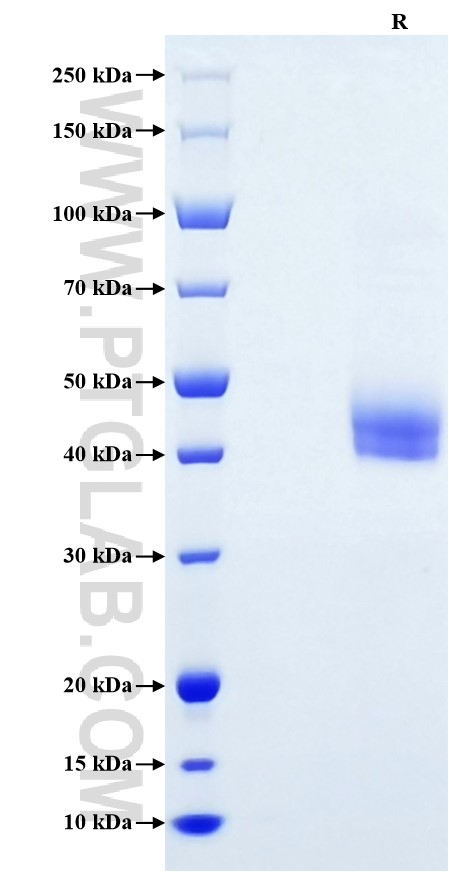Recombinant Human IL-12B protein (His Tag)
ED50
/
Species
Human
Purity
>90 %, SDS-PAGE
GeneID
3593
Accession
P29460
验证数据展示
Technical Specifications
| Purity | >90 %, SDS-PAGE |
| Endotoxin Level | <1.0 EU/μg protein, LAL method |
| Biological Activity |
Not tested |
| Source | HEK293-derived Human IL-12B protein Ile23-Ser328 (Accession# P29460) with a His tag at the C-terminus. |
| Predicted Molecular Mass | 38.5 kDa |
| SDS-PAGE | 40-48 kDa, reducing (R) conditions |
| Formulation | Lyophilized from sterile PBS, pH 7.4. Normally 5% trehalose and 5% mannitol are added as protectants before lyophilization. |
| Reconstitution | Briefly centrifuge the tube before opening. Reconstitute at 0.1-0.5 mg/mL in sterile water. |
| Storage |
It is recommended that the protein be aliquoted for optimal storage. Avoid repeated freeze-thaw cycles.
|
| Shipping | The product is shipped at ambient temperature. Upon receipt, store it immediately at the recommended temperature. |
Background
Interleukin-12 (IL-12), is a cytokine that is secreted by activated phagocytes and dendritic cells and that induces interferon-γproduction by natural-killer and T lymphocytes. IL-12 is a 75 kDa heterodimer composed of a 35 kDa subunit (IL-12A p35) and a 40 kDa subunit (IL-12B p40) that is secreted by a wide variety of antigen presenting cells (APCs), including phagocytes, B cells and Langerhans cells. IL-12 p40 has been found to be important for sustaining a sufficient number of memory/effector Th1 cells to mediate long-term protection to an intracellular pathogen. Overexpression of IL-12 p40 was observed in the central nervous system of patients with multiple sclerosis (MS), suggesting a role of this cytokine in the pathogenesis of the disease. The promoter polymorphism of IL-12 p40 has been reported to be associated with the severity of atopic and non-atopic asthma in children.
References:
1. Cooper AM. et al. (2007) Trends Immunol. 28:33-8. 2. Wang SZ. et al. (2004) J Immunol. 173:4040-9. 3. Bielekova B. et al. (2012) PLoS One. 7:e48370. 4. Xu J. et al. (2016) Cell Death Differ. 23:1941-1951.
